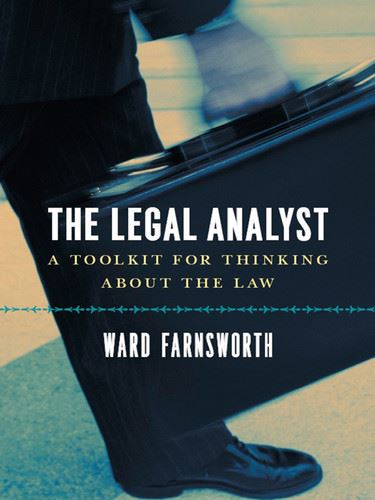

Every household should have a copy.
Click here to read the preface, or here and here to read sample chapters.
Interested in argument? Try this.
Interested in the law of restitution? Try this.
Interested in philosophy? Try this and this.
Interested in rhetoric? Try this.
Interested in metaphor? Try this.
Interested in chess? Try this, or visit the online version here.
Welcome to the webpage for The Legal Analyst: A Toolkit for Thinking About the Law.
The most important part of a legal education isn’t the knowledge gained of legal rules. It’s the knowledge gained of tools for thought that can help solve problems of every description. The Legal Analyst is a guide to the most useful of those tools—principles from economics, game theory, cognitive psychology and other fields that can be used to take apart questions of all kinds. The book gathers the most interesting such ideas and explains them in plain language with many clear examples of how they work. It’s an ideal book for those starting law school, and also valuable for lawyers, scholars, and anyone else with an interest in the legal system.
The book is available from amazon.com here.
What people are saying about the book:
The one book I recommend to students who ask what to read before starting law school is Ward Farnsworth’s The Legal Analyst. —Brian Leiter, University of Chicago School of Law.
Farnsworth’s book is chock full of the kind of tools that every legal analyst should have in his or her back pocket. This ambitious book is likely to spur a lively debate about what exactly are the essential tools of legal analysis. Farnsworth is forging a new pedagogical canon. —Ian Ayres, Yale Law School.
This is one of those rare books that will actually raise the level of analysis at every law school in the country. A must-read not only for students just beginning law school, but indeed for anyone who could use a reminder of how diverse and powerful the legal toolkit really is.
—Douglas Lichtman, UCLA Law School.
A superb book—the best of its kind—about what it means to think like a lawyer.
—Bryan A. Garner, author of Garner's Modern Legal Usage and much else.The Legal Analyst provides an engaging and enlightening introduction to the most essential concepts of legal reasoning. In exceptionally clear prose, Ward Farnsworth walks the reader through concepts such as the Coase Theorem, the Prisoner’s Dilemma, and Property Rules and Liability Rules—peeling away the fog of confusion that often envelopes them to reveal the deep and startlingly simply insights that they offer. The reader comes away from the book with a toolkit of ideas that can be used to take apart and examine almost any legal issue. —Oona A. Hathaway, Yale Law School.
This is an outstanding book. It occupies a significant and unique niche in the literature of jurisprudence and legal methodology. The beauty of this book is that it introduces students and practitioners alike to basic methods of analysis of legal rules and outcomes across a broad range of disciplines (economics, psychology, sociology, jurisprudence, and evidence). This should become the ultimate “toolbox” for those new to, or simply interested in, the profession. —David J. Bederman, Emory University School of Law.
This book is a very accessible introduction to the major ideas of modern legal thinking and a useful survey of current thinking in the field. It covers an extraordinarily broad range of topics in a limited space and is very clearly written, studded with interesting examples and observations. It can profitably be read by law students, lawyers, and lay people with an interest in the legal system. —Daniel Farber, Boalt Hall School of Law, University of California, Berkeley.
Clearly and helpfully explains the structure of various kinds of legal arguments—arguments about efficiency, public goods, slippery slopes, hindsight, bias and more. An excellent book for law students, soon-to-be law students and lawyers. —Eugene Volokh, UCLA Law School.